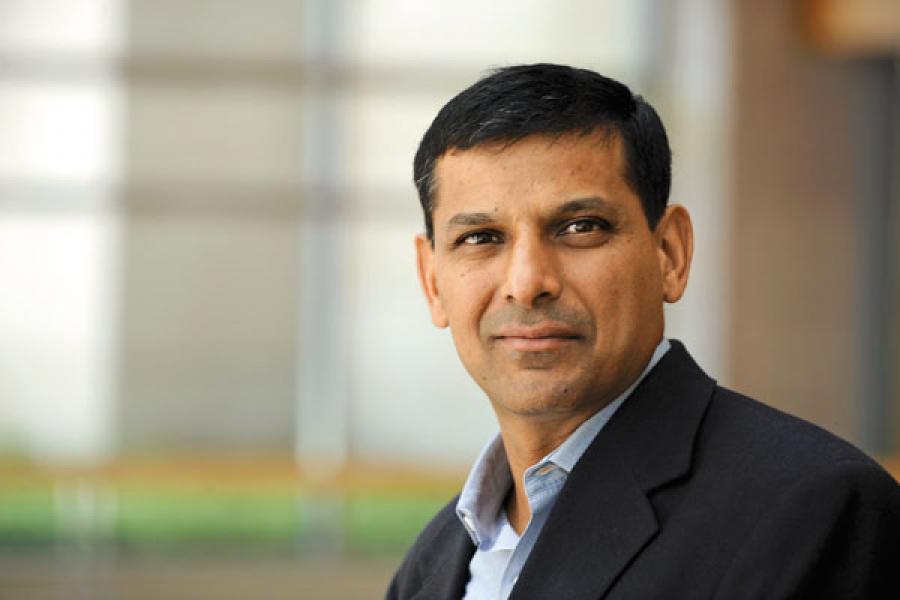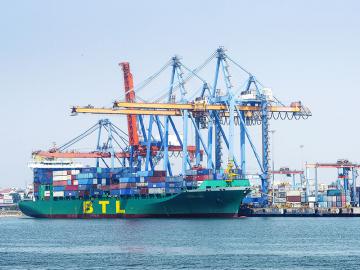
Free Enterprise Vs. Regulation
Raghuram Rajan had seen the impact of over-regulation in an underachieving economy. Years later, he also saw the perils of under-regulation as championed during the Alan Greenspan era. The Eric J. Gleacher, Professor of Finance at the Booth School of Business discusses the question of achieving the right mix of free enterprise and sensible regulation
Raghuram Rajan
He is one of the few economists who balked at the inadequacy of regulation in the US financial system in the early 2000s and warned of a potential catastrophe. Former chief economist of the International Monetary Fund and now an honorary economic advisor to Prime Minister Manmohan Singh. Raghuram Rajan’s books include ‘Saving Capitalism from the Capitalists’ and ‘Fault Lines: How Hidden Fractures Still Threaten
the World’.
How do we resolve the dilemma between allowing people the freedom to start businesses and do what they want to, and the need for regulating enterprises? To use your own phrase, there could be a ‘fault line’ in the interface between these two seemingly contradictory objectives.
I don’t think there is a contradiction between regulation and free enterprise. It is really a question of balance. If you have too much regulation, it can kill competition. And often, regulation is driven by the powerful among the regulated to suit their purpose. So that can destroy competition too.
One example I can think of is the rule in India that an airline can’t fly international routes unless it has been flying domestic routes for some minimum number of years. That seems to me to be primarily anti-competitive in intent. Are Indian lives more expendable than foreign lives? Why should airlines be allowed to ‘practice’ within India before flying abroad? One possible explanation is simply that it is a rule supported by existing airlines who want to secure foreign routes for themselves.
On the other hand, doing away with regulation entirely is also problematic. In fact, too little regulation can also kill competition. Suppose there is no airline safety regulation. Then passengers would be primarily flying the large, established carriers. They would be too scared to fly the smaller carriers because they would be worried that they wouldn’t have paid enough attention to safety. If there was a safety regulator who checked that every airline maintained its aircraft to the requisite standard that would give start-ups a chance, because the regulator’s endorsement would give people more trust
in them.
That is the balance we want to achieve. You can go too far and therefore limit competition. Or you can do too little regulation and again limit competition. There is a golden mean. How to find that golden mean to promote entrepreneurship and competition is a difficult task.
For 10 years, microfinance institutions were growing on their own. They got into some problem and now the Reserve Bank of India (RBI) is trying to regulate them. But there is at least one group of people that think that the RBI may be trying to regulate it in a way that favours the banks. How do you make sure that there is a rule-based system in which regulators operate and there are checks and balances against the regulator also?
That’s important. It is difficult to ensure that there are sufficient checks and balances on the regulator so that you don’t get excessively intrusive regulation imposed by the big incumbents. I think this is the danger. Again and again, the incumbents will use things like safety and risk management to argue that they alone should get the bulk of profits. They will argue only the incumbents can keep the system safe. But the danger to a system from having large, inefficient incumbents is far greater than the danger from allowing the entry of vibrant, low-risk enterprises.
The issue of microfinance, unfortunately, is something that has gone through every controversy that India can possibly manufacture, ranging from some cases of terrible private practices like coercion etc. to political fights for power and influences. Clearly, some interests want to see this industry shrunk [in favour of] public sector bank lending.
Now, there are people who genuinely think public sector lending is safer and is less subject to the kind of terrible practices that the private sector sometime indulged in. On the other, there is another group that wants the public sector reinforced because they can influence who the public sector loans are given to, and gain political or pecuniary advantage. They have much less influence on private sector loans. So there are a lot of influences playing into this debate.
I think it is important we have some clean, clear regulation here, but not excess. Let us not kill the innovation that is happening in the sector and the access that is increasing for the poor by over-regulating it. In some sense, the whole reason this industry has come to light is especially because it has been successful and expanding. If it were small, nobody would pay attention to it. The fact is that in Andhra Pradesh it has such a big presence. It is something that has forced people to pay attention. I think we should be very careful about keeping the baby while throwing the bath water. There is a very clear danger that we [may] throw out everything together.
Our private sector was small till recently. Perhaps we did not have the need for multiple regulators earlier. So the talent for regulation — the human capital — is sort of limited. That is perhaps one of the reasons that some regulator might go two steps or three steps too far because he wants to be seen as a conservative regulator.
Yes, it is indeed a danger. You picked a very good point, which is that some time, the lack of competence is covered up by over-regulation. “I don’t have guys who can understand the risk of derivative contracts so let me get it banned.” This sort of thing happens in every country.
First, we have to accept that the regulatory sector should have some knowledge of the industry itself. Having a regulator who has no understanding of the industry is problematic. At the same time, having regulators who are conflicted because they are in bed with the industry is also problematic. So what you need is a way the regulator can understand about the industry; perhaps pick people from the industry for certain specialised positions. But we have to make sure that their allegiance now shifts to the regulator rather than stay with the industry. That’s a difficult task. You know, it often implies strictures on what you can do after you have left the regulator.
For instance, we should be able to require that former regulators cannot lobby their ministry or take up any position within the industry for profit for say, two years, after leaving the regulator. We need clean rules like that. There is always this spectre of an official, immediately after leaving the regulator, working for a large company that benefits from the regulation. That is problematic.
The problem with completely banning people from working in the private sector after working at the regulator is that the regulator will have to compensate for the lost opportunity. It requires the pay scales to be much higher and that will be a little too much in a country like ours.
The 2G scam that is being talked about a lot and a few other scandals have shown that businessmen ingratiate themselves to the government and get things done their way. This is sort of a regulatory failure. How do you firewall the regulator from such influences?
The issue here is that it is very hard for the public sector to be much cleaner than what the private sector will allow it to be. We have to accept that it is not just a problem of the public sector or a problem of the politicians. Corruption does not emerge in a vacuum. It is on both sides — the bribe-giver and the bribe-taker. We focus too much on the political side. What about the private sector that is trying to influence the politicians?
The current focus and scrutiny of such practices is long overdue. It is also the sign of a very healthy society. I am encouraged by the fact that the government has said that we will take the case to where it leads. In which previous regime have we seen a minister being jailed?
Of course, what we want to signal is that there will be no tolerance of this industrial scale corruption. The broad message has to be that we have to work to create processes and stick to them. Look at the difference between 2G and 3G. It is the fact that 3G [auction] worked so well that exposed what happened in 2G. That shows we can have the level of transparency that can overcome the potential for corruption.
If you look at the small guys trying to do business in India, they have to go through dozens of processes, bribe dozens of officials and handle police intervention. That, itself, is a failure of the free market. How can we stop the State from derailing the basic human right of somebody to earn a living?
I think it is a process rather than a one-off. We constantly need to find way to make this State an enabling rather than a disabling State. The change in mindset we need to see is that free enterprise is generally quite good. Freeing up restrictions is very, very important. Let us work on it. And understand that starting an enterprise is not a bad thing.
The question that regulators must constantly ask before making a regulation is, ‘will this lead to a better environment or end up stoking more corruption?’
For instance, the early versions of the Right to Education Act seemed to suggest that putting mandates on the private sector will lead to high quality private education. Instead, that could lead to more bribes and a higher cost to the private sector, with no improvement in the quality of education.
I think that the mindset that every regulation is perfectly enforced and leads to the desired outcome typically does not hold true given the weak governance in this country.
In the US, inefficient companies are quickly weeded out making place for more efficient ones. But in our country, we don’t let our inefficient enterprises die quickly. Especially in the public sector, we endlessly try to keep clearly unviable companies alive.
That’s why I think improving the structure of worker safety net is very important. If we make sure that the employees have some support, it will be easier for us to let these companies go. We should have a good unemployment insurance scheme that achieves this.
We should then allow failing companies to die. I think destruction is part of life. But we have to accept the humanitarian element and make sure the unemployment insurance scheme supports the employees, not indefinitely, but for some time as they look for a job.
Some time ago, we had this conflict between the insurance regulator and the stock markets regulator over who has the jurisdiction over unit-linked insurance plans. The two couldn’t come to an agreement. In the end, the finance ministry said it will play a role when such conflicts persist. Now, a moral question has been raised over the government playing the role of the super regulator.
A super council brings regulators together, with the government acting as their arbitrator. It is not unthinkable that the government be this tie-breaker, should there be a tie, so that the regulators don’t fight interminably. Does it compromise the independence of any regulator? No. In fact, it is the government that appoints the regulators. No regulator in that sense is protected against being removed by the government. Adding a council to that structure where the regulators can talk together and discuss issues of overlap, and where the minister or the government appointee acts as a tie-breaker, shouldn’t compromise independence.
A lot of independence in our system is implicit. For instance, the finance minister could influence interest rates. But he accepts the tradition that it is RBI that sets the interest rates. The ministry respects regulatory independence.
So, I don’t think the government coming in as a tie-break is a power grab. I would say the way the relationship between the ministry and the regulators works out in many areas shows that it is quite possible that it will continue to work in this case. Of course, respect and vigilance is needed on all sides to enable the relationship to work out.
Are there global models of governance that we could adopt to achieve the right balance between free enterprise and regulation?
I think India has to create its own model. It is too big to follow what is implemented elsewhere. We have to see what our conditions require and follow that model. And send the model to the rest of the world. We have seen that happen in the realm of appropriate technology, with frugal engineering emerging as a way to serve the bottom of the pyramid.
Great Indian thinkers like C.K. Prahalad helped crystallise and popularise Indian business practice. Hindustan Lever’s shampoo sachet helped C.K. Prahalad think of how there were profits at the bottom of the pyramid. Similarly, we need to work out what kind of governance model might work well in India, given Indian conditions. And maybe, we will come up with something that we can spread to the rest of the world.
(This story appears in the 03 June, 2011 issue of Forbes India. To visit our Archives, click here.)















